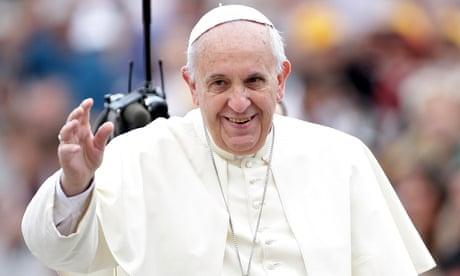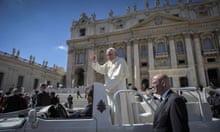The leadership of the Roman Catholic church is bracing itself for open conflict over its treatment of remarried divorcees as powerful conservatives mobilise before a highly anticipated summit called by Pope Francis for next month.
Ever since he announced the extraordinary session of the synod of bishops last year, the Argentinian pontiff has raised the hopes of many liberals that the church may ease its ban on divorced and remarried Catholics receiving holy communion – a move that could affect millions of people around the world.
In February, in an address setting the scene for the meeting due to start on 5 October, German cardinal Walter Kasper outlined the case for a loosening of the rules that would eventually allow some people access to the sacraments after a period of "penance".
But his views are by no means shared by all the so-called princes of the church, some of whom are taking a harder line and insisting that such a proposal would, in effect, violate the doctrine on the permanence of marriage.
It emerged on Wednesday that five leading conservative cardinals have collaborated on a book to be published simultaneously on 1 October in the United States, Italy, Spain, France and Germany in which they make clear their opposition to Kasper's vision.
"It [Kasper's proposal] is being talked about as a form of not recognising the second marriages of divorced and remarried Catholics, but simply looking past them, of tolerating them, and allowing those individuals who are Catholics under certain circumstances … to go to confession and subsequently to go to communion on a regular basis. We oppose that solution as a false form of mercy and we're united on that," editor Robert Dodaro told the Guardian. "It's false mercy in the sense that it ignores the status of the original marriage, which we believe to be indissoluble."
Dodaro, who is president of the patristic institute Augustinianum, said the timing of the book's publication, just five days before the two-week synod was due to begin, was not intentional. But there is little doubt the collection of essays – by scholars and cardinals including Gerhard Ludwig Müller, the prefect of the powerful Congregation for the Doctrine of the Faith – represents the drawing of battle lines.
Although Francis has not come down clearly on either side, his repeated calls for the church to become more inclusive and less ruled by casuistry – as well as the decision to ask Kasper to make his address in February – has led many to suspect his sympathies lie with those who want an easing of the ban, even if he has also spoken of the need for "clear doctrine" on the "indissolubility of Christian matrimony".
Kasper has long advocated allowing access to the sacraments to divorcees who remarry without an annulment; in the past his efforts have seen him clash with the hierarchy. Francis, however, praised the German's theology in his first angelus as pope.
Surveys have shown that the ban on holy communion for remarried divorcees is one of the most problematic for ordinary Catholics around the world. A poll commissioned by the US Spanish-language network Univision of more than 12,000 Catholics in 12 countries found that more than half (58%) disagreed with the church's stance.
Observers say a likely compromise is the streamlining of annulment cases, providing more people with the option of having a church court declare that the union was invalid and therefore not a real marriage.





Comments (…)
Sign in or create your Guardian account to join the discussion